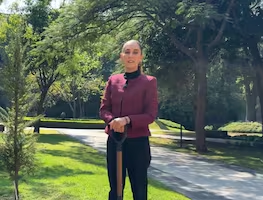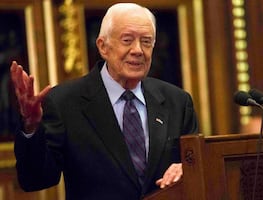Más Información

Sheinbaum publica en el DOF reforma en materia de prisión preventiva oficiosa; entra en vigor el 1 de enero de 2025

Sheinbaum cierra el 2024 con mensaje de Año Nuevo; recuerda legado de AMLO y reafirma continuidad de la 4T
On Friday, Mexican and U.S. business leaders presented a united front against President Donald Trump ’s threats to close the Mexico-U.S. border and urged him to drop steel tariffs that have obstructed the ratification of the USMCA trade deal negotiated last year.
At a meeting in the city of Mérida , attended by government officials from both countries, business lobbies united to call on Trump to drop his threats to disrupt border trade after days of hold-ups at the border .
Describing the U.S.-Mexico relationship as a top priority, U.S. Chamber of Commerce head Tom Donohue said that the United States should exempt Mexico and Canada from steel and aluminum tariffs imposed by Trump last June before its Congress approves the deal struck to replace the North American Free Trade Agreement.
“That is why we are the first out of the gate to warn against the disastrous consequences of closing the U.S.-Mexican border ,” Donohue said, sitting next to Mexican President Andrés Manuel López Obrador , who warmly applauded his speech.
Mexico
is the United States ’ second biggest export market and third biggest trading partner . Mexico-U.S. trade is worth about half a trillion dollars a year.
Both Mexico and Canada want Trump to drop the metals tariffs before their lawmakers approve the deal agreed in September, known as the United States-Mexico-Canada Agreement (USMCA).
But tensions over the border and Central American migrants are delaying the process.
Following a surge in asylum seekers who have been traveling through Mexico from Central American countries, Trump threatened to close the border if Mexico did not immediately halt illegal immigration . His government then redeployed border agents to police the frontier, sparking delays which have cost businesses on both sides millions of dollars.
After Donohue spoke, Carlos Salazar , president of Mexico’s powerful CCE business lobby, weighed in to say he hoped the U.S. government understood the need to keep the border open.
“And let’s not confuse migration problems with trade problems and industry problems,” Salazar said.
As usual, López Obrador himself avoided any implicit or explicit criticism of Trump , instead offering thanks to the American President for “being open to deal with our commercial, migratory, and security matters with respect.”
Trump
’s Commerce Secretary Wilbur Ross was present, he praised the relationship between both countries on Twitter .
The event was part of the latest iteration of a recurring business forum known as the U.S.-Mexico CEO Dialogue.
On the sidelines, Mexican Economy Minister Graciela Márquez met with Ross and urged the United States to end the metals tariffs for Mexico, part of a set of national security measures Trump had ordered under the so-called “ Section 232 ” mechanism.
In addition, the minister asked that Ross push forward talks aimed at reaching a quick deal in a stop-start tomato dispute between Mexican and U.S. producers .
Márquez was able to promote a workers’ rights bill that Mexico’s lower house of Congress approved late on Thursday, after U.S. House of Representatives Speaker Nancy Pelosi said U.S. Congress would not ratify the USMCA until Mexico passed a new labor reform.
U.S. Deputy Energy Secretary Dan Brouillette
met with Mexico’s Energy Minister Rocío Nahle . She said she told him that the new government did not plan to roll back an energy overhaul passed by the previous administration.
The 2013-2014 reform opened up oil production and exploration to private capital , drawing significant interest from U.S. investors . At the time, López Obrador roundly attacked the reform . However, he has since said he will give private operators time to show that they can increase output .
gm









